Turbo-3 lifts Bronco Sport above 30 mpg
Filed under: Weekly test drives, Autos
By John Gilbert
The new Ford Bronco Sport — the smaller of the two Broncos being introduced for 2021 — may be the big seller for Ford because of its sophistication as a utility vehicle for everyone, not just heavy-duty off-road types. There are various models within the Bronco Sport group, and having reported on a couple of them, it’s time to also delve into the Outer Banks.
Or maybe you dive into the Outer Banks, if you’re taking a late-summer vacation. We took it everywhere, to play tennis, and to go hiking, where my wife, Joan, enjoyed exploring new trails.
The inner features of the Outer Banks model are set up for folks or small families that have an adventurous side and may want a vehicle that will do anything and everything as a small-family hauler, but also can take the water-toys along and make sure the leftover sand can be easily washed out, or the family hound can be transported home messy knowing you can clean up with a rinse.
I found the Outer Banks had its biggest surprise under the hood, where the Rapid Red Bronco Sport carried Ford’s smallest mainstream engine — a 1.5-liter, 3-cylinder, turbocharged up to EcoBoost standards, which means 181 horsepower.
When you go for a test-drive, do not bypass this one just because it’s a 3-cylinder, which seems weird to the sensibilities of American buyers used to V8s, V6es, or 4s.
In building engines, a lot of 4-cylinders run smooth, but a lot of them don’t, too, because they have a harmonic vibration that frequently needs to be settled down with anti-vibration techniques, up to and including counter-balance shafts. Remember companies such as Volvo and Audi used to have 5-cylinder engines that had the same effect on buyers, but having 3 or 5 cylinders means inherently vibration-free operation.
So when you take a drive in a Bronco Sport, try the Outer Banks and pretend that you’ve been told it is either a small V6 or a quite-potent 4-cylinder, and you’ll be extra impressed at the pep of that 1.5 EcoBoost. For those who understand all that, knowing it is a turbocharged-3 will be an attraction, rather than a detriment, and the way it sips fuel running around in traffic will impress you even more.
What will astound you, is when you stop to refill the fuel tank and calculate that on your last tankful you got 32.4 miles per gallon. That is not just an estimate, either. The test vehicle I drove for a week up and down the North Shore, revisiting Hwy. 61 along Lake Superior’s wildfire-smoke-infested air in this late summer of 2021, was driven in both highway travel and up and down the hills of Duluth, Minnesota.
Our combined driving included a run up the Shore to Castle Danger, where we again marvelled at the all-rock expanse of beach. After all our combined driving, our tankful calculated out to 32.4 miles per gallon.
Now, in an all-wheel-drive SUV, even if compact, that’s impressive, although I must admit we never bothered with the AWD in the heat of August, which has now proven to be the hottest in Duluth’s history.
For those unfamiliar with the Bronco Sport, it gets the old name on an all-new project, which is a sort of boxy vehicle plunked down on a smaller platform from the full-sized Bronco. No sense creating an all-new platform, though, because the popular Ford Escape compact SUV is right across the showroom and is one of Ford’s most popular vehicles. So Ford put the neat new body on the Escape platform.
With some surprise, I find the Bronco Sport, boxy or not, handles with quicker agility than the sleeker Escape, so the match works.
Comfortable bucket seats up front, and fold-down bench in the rear are covered with this special bullet-proof fabric that feels rugged and yet not uncomfortable, and again is aimed at efficient clean-up. You could, as mentioned, hose out the rubberized rear storage area, after you’ve folded the rear seats down, or by leaving them up.
The larger EcoBoost 4 develops 245 horsepower, which is more than enough for any service. I say more than enough because I am convinced the EcoBoost 3 with its 181 horses can breeze up Duluth’s steepest mile-long avenues with ease. Read more
F-150 adds hybrid to boost power, mpg
Filed under: Weekly test drives, Autos
By John Gilbert
As we’ve learned through the COVID-19 pandemic, we have not only survived, but gotten comfortable working from home instead of in the office. Ford Motor Company is trying to take us one step beyond that — working not in the office, not at home, but in a new F-150 pickup truck.
Not just any garden-variety F-150, of course, but an F-150 4X4 SuperCrew XLT. The name and designating letters don’t tip it off, but this pickup takes it one notch beyond that. It’s a hybrid.
Ford knows that its top competitors, particularly the Ram 1500, but also including Chevrolet’s Silverado, GMC Sierra, Toyota Tundra, and even the midsize Honda Ridgeline, have filled their interiors with all sorts of creative features and ideas to make it more livable, so Ford has tried to include all that, with a larger dashboard screen, the latest in SYNC technology, and a console large enough to house all sorts of work-targeted things, such as file folders and just about the files themselves.
Flipping the console lid creates a desk-like surface, and the Pro Power OnBoard system makes it a virtual office on wheels.
But while loading it up with features, Ford makes sure the SuperCrew XLT over-achieves when it comes to operating as a basic pickup truck, too!
For power, the 3.5-liter EcoBoost is renamed by Ford as “PowerBoost,” to designate not only a turbocharged power boost, but also the added energy from a 44-horsepower permanent magnetic synchronous electric motor. This concept is Ford’s own, dating back to when it competed with the first Toyota Prius and Honda hybrids. It mostly resembles Honda’s, fitted between the V6 and the 10-speed electrically operated transmission. There is also a 1.5 kilowatt-hour lithium ion battery under the floor of the rear seats.
Combining all that power gives you 430 horsepower and a whopping 570 foot-pounds of torque.
That adds up to a payload of 2,120 pounds, and a towing capacity of 18,700 pounds.
The other more useful and more obvious benefit of the hybrid modulating the turbo V6 power is that the test pickup — which came in stunning Velocity Blue that led numerous passers-by to casually say, “Beautiful color,” or “Nice color” whenever I climbed out of it — also is fantastic when it comes to fuel efficiency.
Having driven virtually every pickup that has come out over the last few decades, I am used to full-sized pickups getting 10-14 miles per gallon, and maybe 17-18 on a good day. Adding the turbocharger won’t improve gas mileage, but adding the hybrid technology meant that driving mostly in city traffic, up and down the hills of Duluth, Minnesota, I was able to get 24-25 mpg, even while showing off the trucks power with bursts of acceleration.
Having the enlarged fuel tank also means you can drive from Duluth to Chicago without refilling the tank, and you would still have enough left to drive around for a day or two. As I drove on my appointed tasks, and a few unappointed ones, I kept a closer and closer watch on the fuel gauge. When I had driven 486 miles, with an indication that 123 of those miles were on electricity, the instruments indicated that I still had 194 miles to go before empty. In a lot of cases, a normal pickup truck with a potent engine might settle for 194 miles on a full tank.
All the features and technology costs a bit, of course. The basic XLT starts at $43,805, but the liberal offerings from the option list boost the total to $65,256. I’ve driven more expensive trucks, but none with the same level of useful features as this F-150 XLT Hybrid. Read more
Did Buick Envision ‘Chinese takeout?’
Filed under: Weekly test drives, Autos
By John Gilbert
We went for a casual ride to downtown Duluth last weekend, and we decided to park the 2021 Buick Envision I was test-driving at the curb on London Road, so my wife, Joan, our older son, Jack, and I could stop to smell the roses, so to speak.
One of the true treasures of Duluth is that Rose Garden, which spreads out across a couple blocks of parkland from 11th to 14th Avenues East, near Leif Erickson Park. A stroll through the various clusters of roses and other flowers also affords you a stunning view of the Aerial Bridge and the Westernmost tip of Lake Superior. A major attraction of that garden is that the roses are almost all hybrids, in a mix and match assortment that simply can’t be duplicated anywhere else in the world.
That is not unlike a parallel to the new Buick Envision. When Buick brought out a new, somewhat compact wagon called the Envision five years ago, I found it to be surprisingly attractive and remarkably competent. It wasn’t world class or anything, but it was pretty neat, and reasonably without disagreeable elements.
There was a lot of talk about “buy American,” and here was a proud American car name affixed to a car built in China.
For 2021, Buick has thoroughly redesigned the Envision, and our trip to the Rose Garden was pretty conclusive evidence that the car is, after all, world class. As well as evidence that the rapidly developing Chinese auto culture is catching on to the things that are important to U.S. buyers.
After we spent a half hour at sundown mingling with tourists and roses, we circled back to behind where the Envision was parked along the curb. Joan walked up at first to a vehicle parked 50 feet behind it, and Jack and she examined it alongside our Envision. It was a new BMW X5, one of the more impressive SUVs in a world full of SUVs. We looked over both of them strictly from a design standpoint, and we all agreed that the Buick Envision was the better looking of the two.
Outrageous? Maybe, but it is a comparison based on the overall similarity of the two, bolstered by the fact that a person could mistake one for the other. Both appeared to be black from the outside, but a closer look at the many metallic highlights verified the Envision’s “Ebony Twilight Metallic” identification worked.
The all-new Envision design has a quite-racy front end and a pleasingly attractive silhouette, plus a neat rear end as well. Inside, Jack drew rear-seat duty most of the time, but he never complained because it had supportive 60-40 bench seats and a lot of headroom and legroom. He did complain that the Bose 9-speaker premium audio system could use a more dynamic approach to rear sound.
The front buckets were also comfortably supportive, and while the Envision would not be mistaken for having sports-car handling, the tester ST model had an upgrade from 17-inch wheels to 20-inch black alloys, mounted with 245-45 R20 Continental tires. There is a driving mode that allows you to select Tour, Sport, or Snow/Ice, and we found it was not harsh in sport, and it was a bit softer in tour. I would like to compare, however, because generally, going to 20-inch wheels with lower profile tires can lead to rigidity, compared to reaching the same circumference with thicker tires, giving you more rubber between smaller wheels and the pavement.
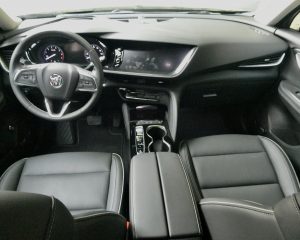
Upgraded Envision has leather seats and attractive instruments, attending to both driver and passenger requirements..
The 2.0-liter turbo four was quick and substantial in all acceleration challenges, and the 9-speed automatic was a welcome presence compared to a CVT, and shift paddles on the leather-covered steering wheel add to the sportiness and flair.
The EPA estimates for fuel economy showed 24 city and 31 highway, and we recorded an average of 31.5 in combined city-highway driving — very impressive compared to other middle-and smaller SUVs. The Envision should be ranked among SUVs, although it isn’t much of a stretch to consider it as a trendy station wagon with SUV tendencies.
Behind the fold-down second row of seats there is a surprisingly large storage area, and I must confess to a surprise that took me the full week to figure out. The first time I opened the hatch, I reached up for the remote switch to electrically close it, but nothing happened. I tried several times, and after finding no response, I pulled down on the hatch and it stubbornly closed, but not quite all the way. As I reached to force it to the final latching, it buzzed and latched itself.
I also asked Joan and Jack to try closing it but they found the same refusal of the push-button to activate it. On the final morning in my possession, I was looking over the array of many buttons and switches and spotted a small button on the door, down below the various window switches. Looking closer, I saw it was a rotating switch that showed full, 3/4, and off, and it was switched to “off.” Sure enough, when I rotated it and pushed it, the hatch opened up, smoothly and efficiently. And also closed at a second push.
If some of the switchwork evaded my familiarity, I might be able to explain by the fact the Envision’s final assembly point is Yantai, China. The country of origin of the engine is China, and the country of origin of the transmission is — you guessed it — China. A lot of people are aware of the advances being made in design and quality by China’s auto-makers as that country surges toward incredible numbers of vehicles and drivers, and they wonder when a truly solid and competent Chinese vehicle will make inroads into the U.S. market.
They can wonder no longer. The Envision is here to tell us all, China is here and has produced a solid, competent vehicle that you might mistake for any of a dozen competitive SUVs. The surprise is that General Motors has been the anchor for U.S. vehicles for so many decades that we are startled to change the old slogan “Buy American” to “Buy Chinese With an American name.”
The price of the new Envision ST is $35,800 as a base, and once you load it up with the Technology Package and the ST package it rises to $41,315. Those additions include a forward park assist, to augment the standard rear park assist, which is the auto-park system that you can see if you watch multiple TV ads for the Envision, parking itself in a tight space, on any Twins broadcast, or elsewhere.
The lane-keep assist, lane-departure warning, cross-traffic alert and blind-spot monitoring are all included standard as well, and all the connectivity devices are in place, too. It is hard to envision, so to speak, all the standard stuff on a competitor for $35,000, or all the included equipment on the ST for $41,000.
One thing that is missing on the test vehicle is that its proper title adds the suffix “FWD” and not “AWD.” The tester was pulled along by front-wheel drive and did not have the all-wheel drive that I know is available. I have written often that if you’re going to get an SUV of any size and you live in the snow-belt area such as Minnesota, you would be foolish to not get AWD.
Naturally, driving the new Envision in Northern Minnesota in this 90s-featured summertime makes AWD unnecessary, ecen to think about, but we also know that winter is coming.
The hot summer makes air-conditioning more important, and it worked fine, even if it did take a half-mile to start throwing out chilly air. You fiddle with the switches and lower the temperature while raising the fan speed, and all of a sudden you are getting icy-cold air blowing too hard. Best to get used to setting it more moderately and driving the first half-mile to get the right blend.
We know that China has been fighting severe air-pollution for years, and we are getting it in Northern Minnesota this year from the numerous wildfires in Canada and in the Boundary Waters, sharing their windblown smoke to choke us up closer to Lake Superior and on into Wisconsin and the Upper Peninsula of Michigan. The Envision has a climate control switch that lets you activate an air-quality indicator, and an air ionizer. When the smoke was at its worst, we flipped on the ionizer and the air-conditioner turned recirculation, and we were breathing cleaner air than anybody on the outside.
Meanwhile, the paddles help in hill-descent, and the stop-start, which is switchable, did a nice job of climbing Duluth’s many steep avenues. When you stop for even a brief stop sign halt, the stop-start shuts down the engine but you are held in place. As you start up, it instantly re-engages and you’re off.
Maybe Buick is setting a good example for General Motors, beating the current chip shortage by expanding on the build capabilities in a country where those chips undoubtedly will come from. But all the right stuff is included on the Envision, which I must say is my favorite Buick model I have ever driven, or seen.
When you park in a shopping center lot, just be prepared for some long looks, and even for some folks to ask you what kind of car that is. Be nice, and don’t say “BMW.” It’s time to spread the word in Buick’s favor.
Infiniti Q50 adds AWD to upscale bargain
Filed under: Weekly test drives, Autos
By John Gilbert
The “big three” Japanese automakers have been dominant in the U.S. auto market for several decades, and as good as utilitarian Honda, Toyota and Nissan models have been, all three have upscale brands that have branched off from the mother ships and made their own way to the top.
At Toyota, that would be Lexus; Honda has Acura; and Nissan has Infiniti. In most cases, the companies push their newest technology out to the public in those upscale brands, and in some cases there is no comparison between the top tech of those and the basic stuff. Toyota, for instance, uses Lithium-ion battery packes on Lexus hybrids compared to nickel-metal-hydride on Toyotas; Honda uses new engines in Acuras, and Nissan uses more potent engines and veers away from dependence on only CVTs in its Infinitis.
In the recent economic drop-off, those companies are reeling in some of their more futuristic vehicles, retrenching in the face of the threat of sales dropoffs.
Some of the Infiniti models may lack the promotional punch of the Lexus and Acura vehicles, but at our house, we figure a couple of Infinitis make our all-time favorite list.
A perfect example is the 2021 Infiniti Q50 sedan, which I recently spent a week driving on the North Shore of Lake Superior. The pleasure of driving such a precise and sporty-performing sedan with climate-control blowing air conditioning throughout the cabin, easily outclasses the discomfort of enduring the outrageous 90-degree heat we’ve been feeling most of this sizzling summer.
The particular model we drove was a Signature Edition, which had extra features inside and out, including a couple that are far too significant to have escaped scrutiny in Motor Trend’s annual new-car-capsule edition. Motor Trend’s “experts” seemed to look for all sorts of reasons to put down the Q50 as less worthy than competitive cars, and while claiming the 2021 model is “unchanged” from the 2020 version, overlooked such details as the 300 horsepower or 295 foot-pounds of torque from the 3.0-liter twin-turbocharged V6.
Also overlooked in their snarky evaluation is the fact that the new Signature Edition has Nissan’s “Intelligent” all-wheel-drive system, accessed by a console switch to allow you to direct the power via the 7-speed automatic transmission to all four wheels when you perceive the need. Such an addition, you might think, would elevate the Q50 up to or beyond the competitors in that segment, instead of trailing. And we got over 25 miles per gallon with all that power available, and that was overall, with most of our driving up the hills of Duluth.
But before we blame Motor Trend too much, Nissan/Infiniti itself needs to be called to account in its Monroney sheet of vehicle details for pointing out that the tester’s sticker price of $52,800 includes $695 for “Premium Paint,” but it fails to inform us what the name of that color is. Paint colors are one place where manufacturers can exercise all sorts of cleverly creative hyperbole. But while you can get away with kissing off black or white as, say, black or white, the test car was a stunning dark blue, which sent me scurrying for the sticker sheet to identify the color.
I admit to being a “blue” person, to the point where my wife, Joan, often downplays blue things because she knows I’ll like them too much. But the Q50 Signature was such a riveting dark blue that Joan pointed out to me how much she liked it before I even had the chance to rave about it. It’s so dark that it appears black in subdued light or at nighttime, but when the sun hits it, the dark blue penetrates your senses.
It also makes the bright silver on the aluminum 19-inch wheels an impressive accent, although Joan and I agreed we’d prefer brushed alloy to let the color be even more prominent.

Leather seats and feature-filled interior includes drive-mode and AWD control switches on the console.
In the annual battle to beat the competition out with features, a couple of Nissan’s major achievements have been in accident-avoidance technology, and in the tech-screen display of monitoring anything you might be backing up toward. While others were coming out with impressive rear-view camera views, Nissan was the first I experienced with full 360-degree surround video in some Infinitis, which showed the ability to scrutinize anything within several feet of your road space in all directions.
On the new Q50, if you hit the right setting you get a top-down perspective of your vehicle with a moat around it, preferably free of any objects. And in their best simplicity, Infiniti calls the system “AroundView Monitor with Moving Object Detection.” That view is in addition to the car’s innate ability for automatic collision notification, predictive forward collision warning, blind-spot warning, lane-departure warning and back-up collision intervention.
All that stuff is standard on the $50,000 Signature version, as is the hill-start assist, adaptive cruise control with distance-control assist, and active trace assist, which can use all those electronic features to keep you in your lane around curves. Naturally, with all those ingredients, linking up with your smart phone is a given, as is the navigation system.
Going back to Nissan’s early sports-car days, with the 240Z and since then, the company has put a premium on sporty and precise handling, and the Q50 snakes around curves as if on those sports-car rails, making it enjoyable to drive and also comfortable both in the passenger and rear seat. A switch on the console lets you pick standard, eco, sport, personal, or snow/ice, for handling or traction needs.
All of those seating surfaces were covered a rich and soft leather.
Also, all the driving enjoyment was amplified — literally — by the Bose 15-speaker audio system, which filled the interior with sounds of your choosing. In fact, so good was the audio system that we spent seven solid days of driving the car before, on the final morning, discovering a neat little horizontal trim line near the audio controls; it was not a trim line, but a CD player! I love CD players, which almost all new cars don’t bother installing any more, I give added gold stars to any that do, because all of us, right up to the biggest MP3 addicts, have shelves or drawers full of CDs, and you would love to be able to play them while on the road.
Maybe if the Q50 had fewer gadgets and features, I might have noticed the CD slot a lot sooner, but I’m going to blame Infiniti for not boasting about it more or at least pointing it out.
If that is the ultimate nitpick, I have one more complaint in such a near-perfect car. OK, two other complaints. One is that the heated seats lacked the more-recent trend of having perforated leather that allows cooled air to circulate and keep you infinitely cooler on hot days. My car doesn’t have them either, but I’ve appreciated them on many of the vehicles I’ve driven since Climate Change decided to fry us all, and I’m sure you could probably find them on the option list for the Q50. But if I’m calling this one of the best near-premium, sports-luxury sedans for the bargain price of $52,800, then cool off my backside, OK?,
My other suggestion is that the Q50’s 7-speed automatic is smooth-shifting and precise, but it lacks steering-wheel paddles, which, with such tremendously responsive power, would be an ideal feature. Maybe they were left behind because the steering wheel already is loaded up with remote controls, but they would advance the pleasure of accelerating or decelerating — especially on hills, where downshifting is the best brake preservative on the planet.
Maybe such things are available for a few more bucks, but those two features are significant enough that one of them would add to the luxury image and the other to the sporty image. Maybe they wanted to see if Motor Trend would notice.
Ascend lets Subaru ascend to big SUV realm
Filed under: Weekly test drives, Autos
By John Gilbert
When Subaru made assorted small all-wheel-drive vehicles and everybody else made big ones, it seemed as though both sides competed with each other in lifestyle as well as vehicle choice. It was sort of like two knights in shining armor pulled their facemasks down, straightened their armor, lowered their lances, and charged! And both sides scored direct hits.
The companies making large, overpowered SUVs have downsized successfully, with a smaller model, or two, or six — while Subaru keeps trying to enlarge some models into bigger SUVs.
It may be that Subaru will never match the Suburban or Expedition or Land Cruiser, and surely it doesn’t want to. But Subarus keep growing, like the new Forester, and now, entering its second season for 2021, Subaru was its own large SUV, with the Ascent.
Interesting name, and obviously it is hoping to conjure up the name of something that will climb the highest mountain, or at least the steepest terrain — or the tallest avenues in a Duluth blizzard — without difficulty.
Presumably, if Subaru sells enough Ascents, it might bring out something still larger, and call it, maybe, the Descent, if it’s decent, because we all know that what goes up must come down, hopefully with style and grace in the process.
The Ascent ranges in price from $35,000 to around $45,000, depending on how many added options you choose. But it does rise above the normal tradition of bargain-priced and compact-sized Subarus.
Subaru fans are amazingly loyal. They love the ruggedness, the dependability, the all-weather hardiness, the all-terrain capability, and if they never push their Subarus to the limits, they like the security of having those capabilities in reserve.
I guess of all the Subarus, my favorite three remain the WRX STi, which is an all-terrain race and rally hot-rod, the Crosstrek, a very tidy compact SUV that leads the company in style, in my opinion, and the now-extinct SVX, which was the sleekest and raciest Subaru ever but was discontinued in 1997. That was my all-time favorite, and I still see one around Duluth occasionally by an appreciative owner.
All Subaru lovers accept the odd, flat-opposed four and six cylinder engines that deliver good power but not great fuel-economy, and we can only wonder where that aging engine will fit if and when Subaru follows the leaders toward electric vehicle power. Or even advanced plug-in hybrids.
For now, we needn’t worry about all that. We have good-size vehicles like the Outback and Forester, and now we have the biggest Subaru with the Ascent, one that’s capable of hauling a family of seven or eight on its appointed rounds, or even off the beaten and appointed rounds.
After spending a week with an Ascent “X” — the sportiest version — we ran it through its paces. We used it for commuting, for running errands, and for cruising, as we ventured off on an assortment of short trips to destinations that took awhile. Our favorite was to drive from Duluth, up the North Shore to Grand Marais, which is quite nearer the Canadian border, and a very neat and trendy little artsy community with a scenic pleasure-boat harbor.
We even found a new place to eat up there, although it took awhile because road construction has found its way into the Lake Superior harbor area of downtown Grand Marais. We circled around to get downtown to check out a couple of outfitter’s stores, and we followed a similar route to get back to the west side and out of town. Then we circled back around to get to the eastern edge of Grand Marais, where our built-in GPS told us we would find a restaurant called My Sister’s Place. We had never visited it before and it has a surprisingly large menu and, we found, very good food that bridges the gap from comfort food to the more gourmet-type offerings. We need to go back to verify our first finding.
That gave us a target beyond the Angry Trout, and Sven and Ole’s Pizza, where you pretty much are drawn in by the name alone and lured back because it’s not only good pizza, but you get a large yellow sticker with blue script lettering to tell the world that you’ve been to Sven and Ole’s. Good to know that Swedes and Norwegians like pizza, too.
My personal favorite stopping place is right near the outfitters store, hard by the harbor. In past columns I have mentioned how that place reminds me of the Jimmy Buffett song, “One Particular Harbor,” and it still does. This time was extra special, because after wandering around town, I heard the faint strains of an Eagles song, being sung outdoors. Following my ears, we walked over toward the water where there was a small stage set up and a fellow was playing the guitar and singing an assortment of Bob Dylan songs, interspersed with a few Gordon Lightfoot ballads. He had a couple of guys backing him up, and he was highly entertaining, both in his choice of songs and in his professional-quality delivery.
I walked up after they took a break and learned his name was Joe Paulik, and he said he plays up there on the beach every Saturday night, only venturing down as far as Duluth on rare occasions. I have mentioned him to a couple of Duluth promoters, who would do well to expand on what has become an all-too-familiar array of performers. I would pay a cover charge to go see Joe, and he would do well at one of the assorted “fests” at Bayfront Festival Park.
Anyway, we also had a good time driving up the Shore and back in the Ascent, stopping along any of dozens of favorite spots such as Iona’s Beach along the big lake, which is always a treat, even if it’s no particular harbor.
The 2.4-liter 4 handled all of our demands of the Ascent with ease, and while performance was adequate, comfort was at a high. I particularly liked the seat surface, which is some sort of new material that is a cut above the usual fake-leather-but-really-vinyl, and is not unpleasant to touch, and feels as though it might be bullet-proof for kids or pets. The material is repeated on the dashboard, which gives the interior of the Ascent a boost as well.
The size of the Ascent is big for a Subaru, but would be compact for other companies, although the key determination in my mind is the availability of a third row of seats. The Ascent has a third row, and it’s reachable by a second row that folds down and slides fore and aft, to ease the entry and exit to Row 3. Let’s face it, though, that third row is for small kids, and especially those who feel gymnastic urges after watching the Olympics.
We got about 24.4 miles per gallon as a normal, everyday average for fuel economy, and the Ascent drinks regular fuel, which is nice, because you are saving 20 or 30 cents per gallon over premium alternatives.
The interior has a sporty flair, something Subaru hasn’t always put on display. The colors and fabrics and trim levels were a step up — Ascending, we might say — over the Subaru norm. All of the connectivity and contemporary features are in place, and I like the thick feel of the steering wheel. Carbon-fiber trim on the dash and doors was a nice touch, too.
While the power was good enough, I was surprised that the handling was just so-so. It felt a little loose, for some reason, and it should have been firmer, based on the sporty styling, and the large wheels, which were shod with 245-45, 20-inch tires.
The big information screen was impressive, also, but there was almost too much. We wanted to find the exterior temperature, for example, because that’s important in this summer of 90-ish highs complemented by Canadian wildfire smoke channeled directly to us, but we couldn’t locate the temp gauge. After scrutinizing the instruments over and over, we finally spotted it, located in its own, separate binnacle up on top of the dashboard by the windshield. We almost needed a GPS to find it.
A definite sporty touch is the presence of steering wheel paddles, which give you the ability to instantly choose if you want a higher or lower gear range, which is particularly helpful if you are descending Duluth’s long and hilly avenues, where it might spend its brakes prematurely if you were to ride the brakes down those hills every day.
There you are, another reason that the Ascent with paddles should next be joined by a Descent model.


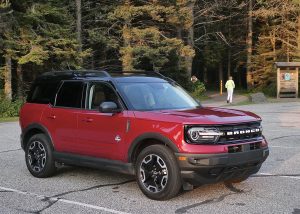
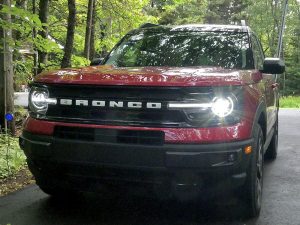
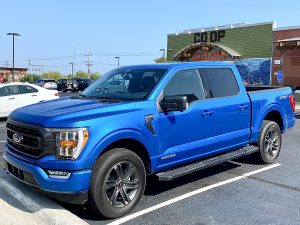
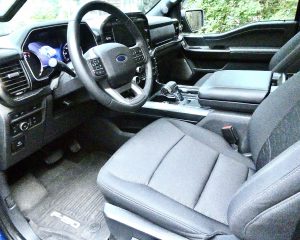
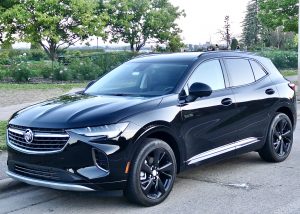
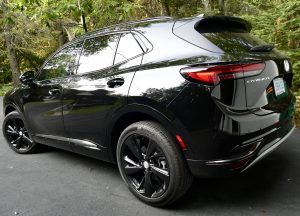
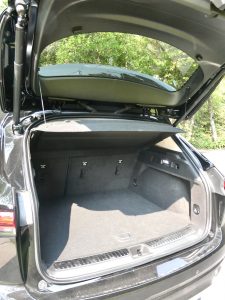
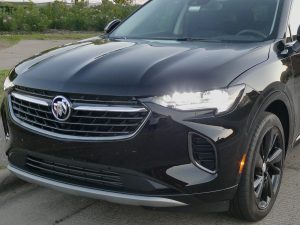
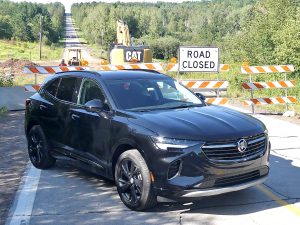
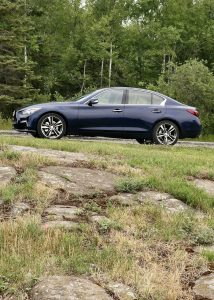
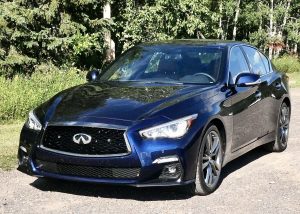
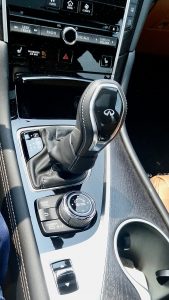
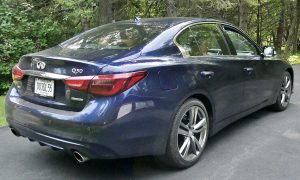
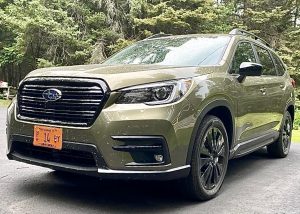
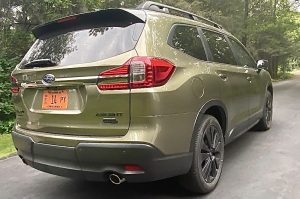
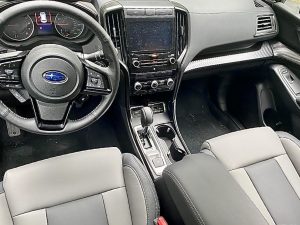
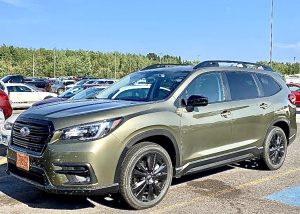
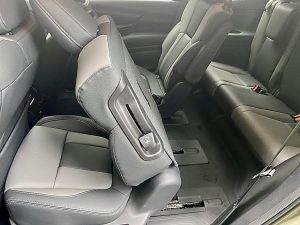
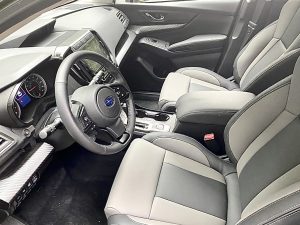
 John Gilbert is a lifetime Minnesotan and career journalist, specializing in cars and sports during and since spending 30 years at the Minneapolis Tribune, now the Star Tribune. More recently, he has continued translating the high-tech world of autos and sharing his passionate insights as a freelance writer/photographer/broadcaster. A member of the prestigious North American Car and Truck of the Year jury since 1993. John can be heard Monday-Friday from 9-11am on 610 KDAL(www.kdal610.com) on the "John Gilbert Show," and writes a column in the Duluth Reader.
John Gilbert is a lifetime Minnesotan and career journalist, specializing in cars and sports during and since spending 30 years at the Minneapolis Tribune, now the Star Tribune. More recently, he has continued translating the high-tech world of autos and sharing his passionate insights as a freelance writer/photographer/broadcaster. A member of the prestigious North American Car and Truck of the Year jury since 1993. John can be heard Monday-Friday from 9-11am on 610 KDAL(www.kdal610.com) on the "John Gilbert Show," and writes a column in the Duluth Reader.